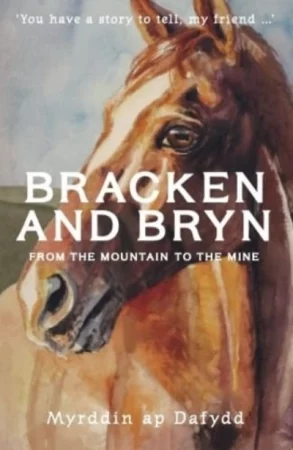How the novel From Bracken and Bryn shows that arrogance and bullying destroy trust and respect
Insightful And Engaging
The social history of communities within Wales has been unfortunately neglected and scantily addressed, particularly in terms of the struggles of the working classes in the coal mining, slate quarrying and farming industries.
Susan Walton has skillfully translated the acknowledged writer and poet Myrddin ap Dafydd’s inspirational socio novel Rhedyn Merlyn y Mawn into English. Titled From Bracken and Bryn, the insightful and engaging narrative clearly relates the physical and emotional brutality faced by human and equine workers in the coal mines during the late 19th and early 20th centuries.
The book focuses on work conditions, wages earned, and treatment experienced by workers in the coalfields of Mold in Flintshire, North Wales. The areas covered included Leeswood Green, Celyn, Cae Bleddyn, and Argoed, all of which were owned by the wealthy landlord at Plas Coed-llai (Leeswood Hall). The key themes encompass how the decisions of local pit owners and businessmen impacted the lives of the pit workers.

Poverty-Stricken Smallholdings
Myrddin ap Dafydd’s balanced and fact-based description draws in the reader by contrasting the arrogant attitudes of the pit owners in their “grand houses” and the plight of the workers as they laboured in the mines and farms or attended hiring fairs in the hope of finding a job that offered food and a place to sleep.
The narrative highlights how the mines offered employment to men and boys from the poverty-stricken smallholdings of rural Gwytherin and surrounding areas, who provided wild ponies suitable for work in the pit. It also highlights the teamwork prevalent in farming communities, where they gather to gather sheep and herd wild ponies, in contrast to the “practice of individual isolation” and lack of togetherness in wage negotiations with pit owners and farmers at hiring fairs in Llanrwst and Bala.
The section on Argoed Colliery describes the personal strength of character of Robin Bagillt as he voiced his opposition to the pit owners following their decision, without negotiation, to halve the wages of workers. At an innovative and groundbreaking meeting, they created a union to speak with one voice to challenge the pit owners. This move made clear the need for the men to achieve the dignity of having a voice in negotiations.
Fundamental Skills
It is during the rounding up of the wild ponies that Bryn comes across Bracken, the pony with “white socks”. The character of the pony demonstrates the fundamental skills necessary to gain rapport with animals. The author reveals how Bracken responds to Bryn’s help in getting him to safety as the pit becomes engulfed in water. This kindness contrasts with the beatings he is given with a leather whip by another miner, Gwyn Coed-Talon. The final chapter encapsulates the freedom experienced as Bryn rides Bracken through Rhydymwyn back to Mynydd Hiraethog.
In addition, the writer speaks of the great affinity with the workers in the Irish work camp who have learnt the language of the mainly monoglot Welsh-speaking workers and work with the ponies in the pit. One of the Irish workers, Ronan, remarked that Welsh was the language of most of the workers and also the language of the ponies. The horses would only respond to Welsh language calls such as tyrd (come on), aros (stay), de (right) and chwith (left).
The text provides insight into the plight of the Irish Travellers during the Great Famine in Ireland, highlighting how many of them relocated to rural areas and subsequently to Mould.

Arrogant And Disingenuous
The narrative exposes how the arrogant and disingenuous attitude of the owners and pit manager dispossessed the miners of their Welsh language, in particular, after the owners appointed John Young, an Englishman, as colliery manager at Leeswood. He unfortunately considered that the men talking in Welsh “were talking about him and managers behind our backs in that barbaric tongue”.
The negative attitude towards and recognition of the Welsh language were also evident at the trial in the Mould magistrates’ court on 2nd June, 1869.
This work is an outstanding socio-novel on a par with Of Mice and Men by John Steinbeck. In terms of insight into Welsh social history, it is exceptional. The issues raised in terms of social equality, unemployment, itinerant workers, positive attitudes to the use of the Welsh language, child labour, treatment of animals, standing together as a team, etc., make for thought-provoking reading. The decision to translate the original Welsh-language edition is worthy of applause, as it extends access to a broader audience. WJEC should consider this socio-novel for GCSE (English).
We hope you enjoyed reading “From Bracken and Bryn“. Click here for more of our book reviews.


